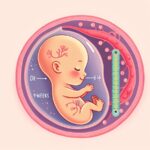Understanding the nutritional needs for a twin pregnancy is paramount for expectant mothers carrying twins. Twin pregnancies demand more from the body, and ensuring you’re getting the right nutrients can impact both your health and the development of the babies. This article delves deep into the nutritional adjustments and considerations necessary for a twin pregnancy, offering comprehensive insights to support you through this unique journey.
Nutritional Needs for Twin Pregnancy: What Changes?
When it comes to a twin pregnancy, the nutritional needs significantly increase. The body is not just nurturing one, but two lives, requiring a careful balance of vitamins, minerals, and overall caloric intake to support healthy fetal development and maternal health. The American College of Obstetricians and Gynecologists recommends a higher calorie intake for twin pregnancies, emphasizing the importance of a nutrient-rich diet.
Specifically, expectant mothers should aim for an additional 600 calories per day, focusing on foods rich in folic acid, iron, calcium, and protein. These nutrients play crucial roles in supporting fetal development and preventing pregnancy complications. For personalized advice, consulting with a healthcare provider is always best.
Key Vitamins and Minerals for Twin Pregnancies
Vitamins and minerals are the cornerstones of a healthy twin pregnancy. Folic acid, for instance, is essential for preventing neural tube defects, while iron supports the increased blood volume required to nourish two babies. Calcium is necessary for the development of strong bones and teeth, and protein is crucial for the growth of fetal tissue and maternal health.
Expectant mothers should also pay attention to omega-3 fatty acids, which support fetal brain development. Incorporating DHA-rich foods like salmon or taking supplements can contribute significantly to your twins’ cognitive development. It’s also important to stay hydrated and consider the intake of vitamin D and magnesium, which support various aspects of pregnancy health.
Managing Increased Caloric Needs
Managing the increased caloric needs during a twin pregnancy can be challenging. It’s not about eating twice as much but eating twice as smart. Prioritizing nutrient-dense foods that deliver the vitamins and minerals your body needs is key. Lean proteins, whole grains, fruits, and vegetables should make up the bulk of your diet.
Snacking on healthy options like nuts, yogurt, or fruit can help meet the increased caloric requirements without resorting to empty calories. Remember, the quality of the food you consume is just as important as the quantity when it comes to supporting a twin pregnancy.
Challenges and Solutions
Twin pregnancies can present unique nutritional challenges, such as heightened morning sickness or increased fatigue, making it difficult to maintain a balanced diet. One strategy to combat this is to eat smaller, more frequent meals throughout the day. This can help manage nausea while ensuring you and your babies are getting a steady supply of nutrients.
Additionally, staying well-hydrated is crucial. Water aids in digestion, helps form the amniotic fluid, and can even reduce the risk of preterm labor and urinary tract infections. Incorporating smoothies or soups can also be a palatable way to consume the necessary nutrients if solid foods are less appealing.
Supplementing Your Twin Pregnancy Diet
While a well-planned diet is fundamental, supplementing your diet during a twin pregnancy can provide an additional nutritional safety net. Prenatal vitamins designed for twin pregnancies can ensure you’re getting the right amounts of crucial nutrients like folic acid and iron. It’s important, however, to consult with your healthcare provider before starting any supplements.
For more detailed guidance on supplementing during a twin pregnancy, the article Nutritional Needs for Twin Pregnancy offers valuable insights and recommendations.
Expert Tips for a Healthy Twin Pregnancy
Finally, maintaining open communication with your healthcare provider throughout your twin pregnancy is essential. They can provide tailored advice and monitor the health of you and your babies, adjusting dietary recommendations as needed. Additionally, joining a support group for mothers expecting twins can provide practical tips and emotional support from those who understand the journey firsthand.
Understanding and meeting the nutritional needs for a twin pregnancy is a critical component of prenatal care. By focusing on a balanced diet, considering supplements, and staying in close contact with your healthcare provider, you can support the development of your twins and maintain your own health throughout this incredible journey.













